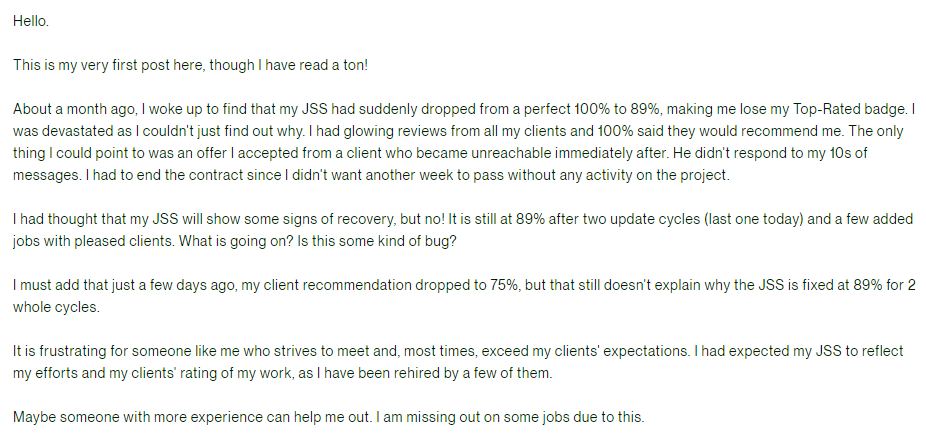
A Freelancer’s Guide to Maintaining a 90%+ JSS On Upwork
Upwork offers many opportunities for freelancers, but to succeed in the most competitive job market, it’s important to have the right information. In the competitive Upwork market, standing out is crucial, and one metric that can significantly impact your freelancing career on Upwork is your Job Success Score (JSS).
For beginners, it’s crucial to adopt JSS best practices from scratch and gradually improve. Even experienced freelancers should take note of these practices to maintain their competitive edge.
In this blog post, we will discuss JSS, its importance, its impact, and how to maximize it for success.
Understanding the Job Success Score (JSS)
Let’s clarify what the Job Success Score (JSS) is and how it’s calculated.
The JSS is a metric used by Upwork to gauge a freelancer’s performance and reputation. It takes into account both public and private feedback from clients, along with other undisclosed metrics. Upwork keeps some details hidden to prevent freelancers from manipulating the system.
In a nutshell, Upwork JSS is a special number that shows how well you are performing as a freelancer on the platform. It’s like a grade you get in school, but for your freelancing work. Your JSS is a score between 0% and 100%, and the higher it is, the better.
Here is an image of a freelancer on Upwork who understands what the JSS is and the impact it has on their ability or chances to win jobs.

This is one of many stories freelancers share on Upwork. Here, a community moderator on Upwork has further detailed instances that can lead to a JSS decrease on Upwork
Calculating Your JSS
Upwork doesn’t share the specific criteria it uses to calculate the Job Success Score (JSS) on purpose. This policy aims to create a healthy, competitive environment for its users.
This deliberate decision encourages freelancers to focus on surpassing clients’ expectations and maintaining positive client relationships.
Calculating Job Success Score

Here is the breakdown of the indicators
Successful contract outcomes:
These are the contracts where you did a great job, and the client was satisfied with your work. Each successful contract adds to your positive outcomes.
Negative contract outcomes:
These are contracts where things didn’t go smoothly. It might include poor client feedback, disputes, or unfinished work. Each negative contract adds to your negative outcomes.
Total Outcomes:
This is the sum of both your successful and negative contract outcomes.
Now, to calculate your JSS, you take your successful contract outcomes, subtract the negative contract outcomes, and divide that by the total outcomes. Here’s the formula:
JSS = (Successful Contract Outcomes – Negative Contract Outcomes) / Total Outcomes
The resulting number is your job success score, typically expressed as a percentage. The closer you are to a 100% score, the better your performance and reputation on Upwork.
So, in simple terms, it’s like keeping track of your wins and losses in your freelancing journey, and your JSS reflects how well you’re doing overall. Upwork uses this score to help clients identify reliable and skilled freelancers.
Factors Influencing Your JSS
Four major factors can affect your score:
- Poor public or private feedback from clients
- A higher-value job outweighs a lower-value job.
- Very positive public or private feedback from clients.
- Past jobs fall outside the six-month timeframe, making them no longer count.

Additionally, Upwork tracks freelancers’ feedback from clients and flags those clients with a history of poor collaboration. They are considerate when it comes to this.
Why Your JSS Score Matters
You might be wondering why a JSS score is so significant. One of the quickest ways for your JSS to plummet on Upwork is to have open but inactive jobs. Inactive jobs can negatively impact your JSS and, ultimately, your chances of landing new projects.
Additionally, clients often use a freelancer’s JSS as a screening criterion when deciding whom to hire. A low JSS can deter potential clients from choosing you.
Long-term client relationships, profile completeness, and Upwork’s practice of flagging clients with poor collaboration histories also play crucial roles in determining your JSS.
Your JSS is calculated every 3, 6, 12, and 24 months, with Upwork taking the best score out of these moving time windows. It’s essential to monitor your JSS regularly and take steps to improve it if necessary.
Eligibility for the Top-Rated Badge
Freelancers aspire to attain the coveted top-rated badge on Upwork. To be eligible, certain criteria must be met, including maintaining a rising talent status or a JSS of at least 90 percent. For agencies, there are slightly different requirements, such as achieving a 12-month agency earnings threshold.
Conclusion:
In the competitive world of freelancing on Upwork, your Job Success Score (JSS) plays a pivotal role in determining your success. The real-life incident we explored serves as a stark reminder of how quickly your JSS can change and impact your freelancing career.
To thrive on Upwork, stay proactive, deliver top-notch service, and build strong client relationships. Your dedication will pay off, and you’ll be well on your way to achieving that coveted top-rated badge. So, check your JSS, take the necessary steps to maintain a high score, and watch your freelancing career flourish on Upwork.
